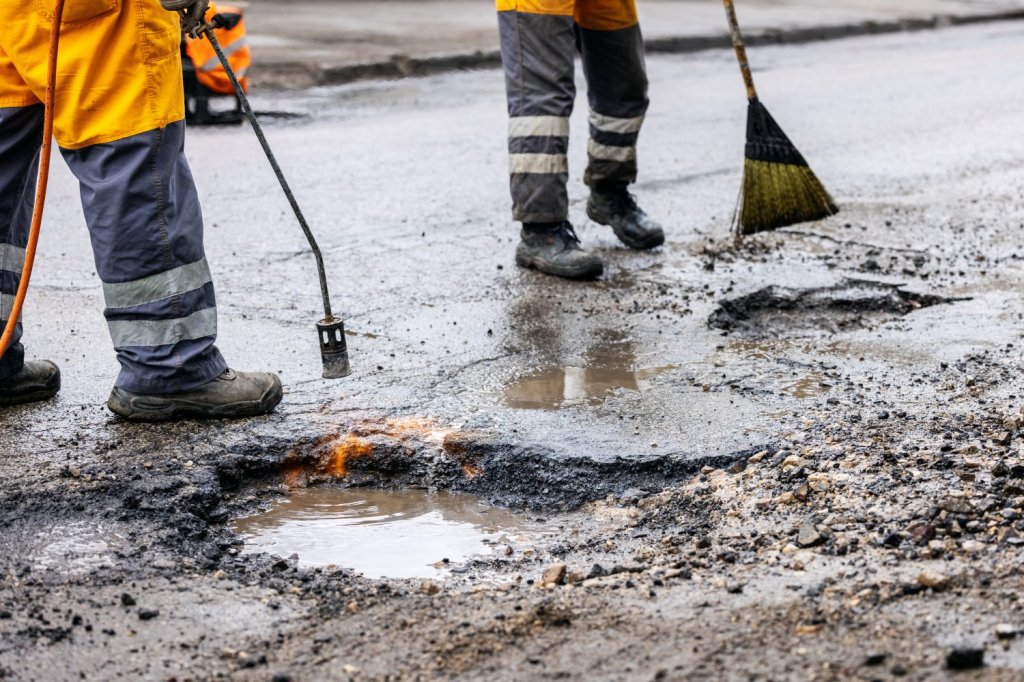The government’s plans to fill millions of potholes and hold councils accountable to their road maintenance targets could be a positive sign for those who drive for work.
A new ranking system for local councils is being introduced to fix the “pothole plague” affecting roads in the UK. And with enough money being pledged to fill seven million potholes, could this be the beginning of the end for the nation’s pothole-ridden roads?
Plus, read about the impact of potholes on small businesses and what you can do if your business vehicle is damaged by one.
Local councils ranked on pothole fixing targets
In an effort to combat the high number of potholes on UK roads, the government is introducing a ranking system for local councils. Under the new process, if local authorities don’t meet their pothole fixing targets, they could have some funding withdrawn.
Councils will be ranked on a RAG (red, amber, green) system to track their progress, and would lose a quarter of their funding if they’re underperforming. With £500 million being allocated to road maintenance in mid-April 2025.
If a quarter of a council’s funding is removed for underperforming, it will be reallocated to ones that are meeting their targets.
This comes as a part of the government’s pledge to fix one million potholes a year, even though they estimate the road maintenance pot could fix up to seven million.
Prime Minister Sir Keir Starmer said: “Until now, nobody has known how many potholes are being filled and where they’re being filled.”
“We all have the experience of driving from one place to the next and we know some places are better than others.”
Does the UK have a pothole problem?
It would cost £17bn to fully fix the potholes on local roads in England and Wales, according to a report from the Asphalt Industry Alliance (AIA).
And the RAC estimated that on average, there are around six potholes per mile on council-controlled roads in England. With 1.4 million potholes needing to be filled in England and Wales between 2023 and 2024.
This is why the government announced their record-level of funding in the Autumn Budget 2024, which they say is enough to fill the equivalent of seven million potholes a year.
Will these targets make a difference?
There’s been some speculation about the impact of the new reporting system, and whether this will encourage more quick fixes than a national overhaul.
Lucy Nethsingha, leader of Cambridgeshire County Council, said: “Our roads are like a worn out pair of trousers, you can keep fixing the holes, but what you actually need is a new pair of trousers – or in this case a proper resurfacing.”
And the Local Government Association’s transport spokesperson, Adam Hug, said: “The funding increase in the last budget was positive and must now be followed by a commitment in the spending review to a long-term financial package to tackle this backlog and put it into reverse.”
But the government recognises this is the beginning of a long process. Transport Secretary Heidi Alexander said she was “not pretending that the money we’re making available will fill every pothole”.
With the Prime Minister adding: “Any council that says to me it’s not enough money, I’d say come back to see me in June when you’ve actually filled these potholes in with your RAG rating and then we’ll see if we can release more money to you”.
Potholes cost average driver £300 a year
When you drive for work, damage to your vehicle from a pothole can have a serious impact. Research from the Federation of Small Businesses (FSB) shows that 47 per cent of small firms have been negatively impacted by potholes in the last 12 months. This can lead to missed jobs, meetings, and even being involved in road accidents.
Vehicle damage caused by potholes can interrupt your business and leave you with an unexpected bill. For one million drivers, the average bill for pothole-related car repairs reached £300 in 2024.
FSB claims many small businesses are unaware that it’s their right to claim this money back from the local council where the accident happened. And they’ve recommended introducing a national pothole damage compensation claim form template that links directly with a national pothole reporting app.
Does van insurance cover pothole-related damage?
If you have a comprehensive commercial van insurance policy with Simply Business, you can claim for pothole-related to your van. Just bear in mind that this will affect your no claims bonus and you’ll need to pay whatever your agreed voluntary excess is.
If you’d rather maintain your no claims bonus, you can report it to the local authority where the accident happened. You just need to share:
- the road name and the nearest feature which identifies the part of the road you were on
- why you think they’re responsible
- what the damage to you vehicle was
- the date and time the damage happened
